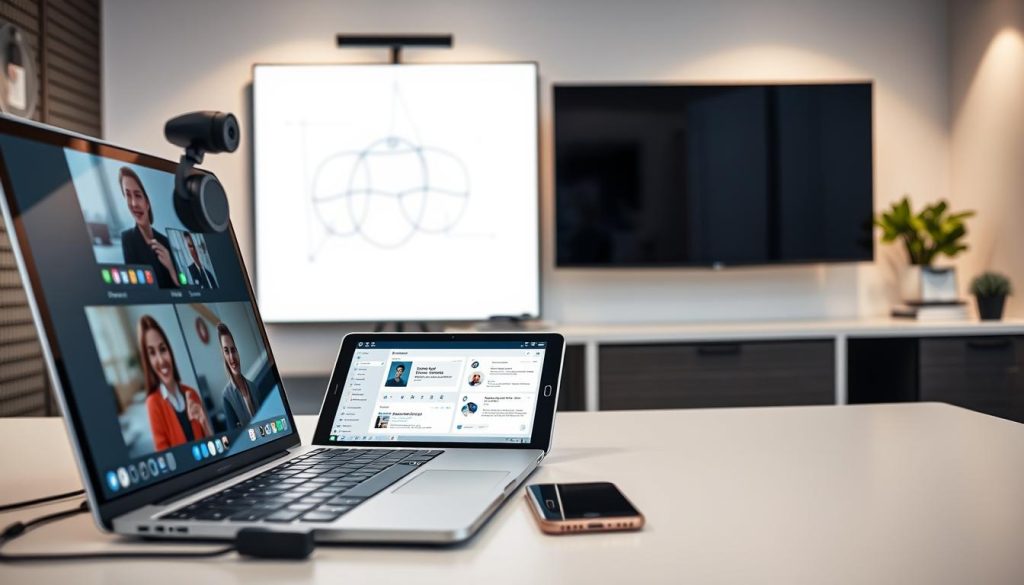Remember when commutes meant crowded trains and rigid schedules? For many professionals in France, the pandemic became a turning point – a chance to rediscover balance through flexible arrangements. Today, remote work isn’t just a trend; it’s reshaping careers globally.
At Umalis, we’ve witnessed this evolution firsthand. What began as temporary telecommuting solutions has blossomed into hybrid models and digital nomadism. Our team helps professionals like you navigate this shift confidently, combining legal expertise with financial clarity.
Modern remote work goes beyond laptops and video calls. It’s about smart tools that protect your interests. Our income simulator, for instance, lets you forecast earnings while managing tax obligations – all tailored to France’s unique regulations. No guesswork, just precision.
Table of Contents
Key Takeaways
- Remote work adoption grew 300% faster post-COVID in France
- Umalis provides compliant payroll solutions for 50+ countries
- Hybrid models reduce overhead costs by up to 30%
- Income simulator calculates net salary in 3 minutes
- 24/7 access to legal experts through client portal
Why settle for uncertainty? Whether you’re consulting from Lyon or developing software in Marseille, our platform turns logistical challenges into opportunities. We handle the complexities so you can focus on what matters – growing your career your way.
Introduction to the Remote Work Revolution
Picture this: In 1973, NASA engineer Jack Nilles coined the term « telecommuting » while developing satellite communication systems. This marked the quiet birth of a movement that would redefine careers decades later. What began as experimental tech-driven arrangements has evolved into a global workforce transformation.
Evolution of Remote Work: A Brief History
The 1980s brought fax machines and early modems, enabling the first wave of remote workers. By 1995, IBM reported 32% of employees operating outside traditional offices. A pivotal moment came in 2004 when the US Marine Corps adopted VPNs for secure field communications – proving mission-critical work could thrive beyond cubicles.
Post-2010 advancements accelerated change. Cloud computing and platforms like Slack dissolved geographical barriers. « We’re not just talking about emails anymore, » notes a Paris-based HR director. « Modern tools let teams collaborate across continents like they’re in the same arrondissement. »
Key Trends Driving Remote Work Today
Three forces shape current patterns:
- Hybrid dominance: 74% of French companies now offer blended models
- Digital nomad surge: Visa applications for location-independent professionals rose 182% since 2021
- Productivity proof: 68% of managers report sustained output from distributed teams
Major brands like L’Oréal and Société Générale now compete through flexible policies. Meanwhile, eco-conscious professionals celebrate reduced commutes – France’s remote workforce cut CO2 emissions by 1.2 million tons last year alone.
Benefits of Working Remotely
Imagine reclaiming hours once lost to traffic jams and rigid office hours. Modern professionals now design their days around priorities rather than punch clocks. This shift isn’t just convenient—it’s reshaping how we measure success in careers.
Freedom That Fuels Performance
A 2023 study revealed 63% of remote workers report higher productivity levels compared to office settings. Why? Personalized schedules allow focus during peak energy times. Parents attend school events without sacrificing deadlines. Early risers complete tasks before lunch.
- Average commute reduction: 72 minutes/day in France
- 83% experience improved work-life harmony
- Companies save €5,600 annually per telecommuting employee
Financial Wins on Both Sides
For professionals, fewer transit costs and lunch expenses add up. Employers see dramatic cuts in real estate needs. A Paris tech firm reduced office space by 40% after adopting flexible work structures, redirecting savings to employee training programs.
“Our team’s satisfaction scores doubled while operational costs dropped,” shares a Lyon-based HR manager. The key? Make sure collaboration tools match your workflow. Video conferencing and cloud platforms keep distributed teams aligned without constant oversight.
Legal and Tax Considerations for Remote Workers in France
Did you know France taxes residents on income earned around the world? For digital professionals, understanding cross-border regulations is non-negotiable. Umalis simplifies this complexity through tailored guidance that aligns with French labor laws and international standards.
Understanding Tax Obligations and Filing Requirements
France’s tax system requires residents to declare all global earnings. This includes:
- Foreign business income (even if reinvested abroad)
- U.S.-based 1099 contractor payments
- Royalties from intellectual property
Example: An American consultant living in Paris pays French income tax on their U.S. client earnings after applying the Franco-American tax treaty credits. Our platform automatically calculates treaty benefits, preventing double taxation.
Navigating Visa and Residency Concerns
France’s long-stay visitor visa permits non-EU nationals to reside here while earning income from abroad. Recent approvals include:
- A Canadian developer maintaining clients in Toronto
- A Japanese designer invoicing Tokyo-based firms
« Submitting proof of sufficient foreign income transformed my application process, » shares a successfully approved visa holder from Australia.
Umalis ensures fully remote professionals meet all requirements, from tax forms to residency permits. Whether you’re based in Nice or New York, we turn legal hurdles into manageable steps.
How to Get Started with Working Remotely
What separates successful professionals in distributed roles from those facing burnout? The answer lies in strategic preparation. Transitioning to location-independent work requires more than just a laptop—it demands a blueprint for sustainable success.
Three-Phase Roadmap for Success
Begin by mapping your professional and financial goals. A Marseille-based UX designer shared their approach: « I used Umalis’ income simulator to compare freelance rates with salaried positions—it revealed 22% higher net earnings through proper tax planning. »
| Phase | Key Actions | Tools |
|---|---|---|
| Preparation | Define income targets Research tax treaties |
Umalis Simulator IRS/French Tax Portal |
| Implementation | Set up invoicing system Establish work hours |
Wave Apps Google Calendar |
| Optimization | Review quarterly taxes Adjust client portfolio |
QuickBooks Umalis Analytics |
Manage multiple income streams effectively. For cross-border professionals in France:
- Allocate 30% of each payment to tax reserves
- Track deductible expenses (home office, software)
- Schedule biweekly financial reviews
« Planning prevented 90% of my compliance issues, » notes a Lyon-based project manager serving US clients. « Automated tax calculations became my safety net. »
Prioritize tools that grow with your career. Our platform’s alert system reminds users of critical deadlines—from VAT filings to visa renewals. Start structured, stay empowered.
Setting Up a Productive Remote Work Environment
Your desk chair could be the silent architect of your career success. In France, 58% of professionals report improved focus when their home workspace mirrors office efficiency. Let’s transform spare rooms or quiet corners into productivity hubs that meet corporate standards while reflecting personal needs.
Designing Your Home Office
Start with ergonomics: position monitors at eye level and invest in lumbar-support chairs. A Toulouse-based UX designer shares: « My standing desk reduced back pain by 40% within weeks. » Use room dividers or noise-canceling headphones to create mental boundaries in shared spaces.
Lighting matters. Natural light boosts alertness, while adjustable LED lamps prevent eye strain during late-night sessions. For small apartments, wall-mounted shelves keep essentials within reach without clutter.
Essential Remote Work Tools and Equipment
Reliable tech forms your foundation:
- Internet: Minimum 50 Mbps upload/download speeds
- Hardware: Dual monitors, ergonomic keyboard, HD webcam
- Software: Zoom for client calls, Microsoft Teams for internal collaboration
Employers can support teams through stipends for high-speed routers or VPN subscriptions. Budget-conscious professionals find value in refurbished devices or free-tier project management tools like Trello.
For those building an effective home office setup, organization is key. Designate specific drawers for work materials and use color-coded calendars to separate professional/personal time. As one Parisian marketer notes: « Closing my office door signals ‘work mode off’ to my family – and myself. »
Tools and Technology for Remote Work

Ever wonder how teams in Paris and Singapore collaborate seamlessly? The answer lies in today’s digital toolkit. Modern professionals rely on specialized platforms that erase borders while boosting efficiency.
Collaborative Software and Cloud Solutions
Leading companies now deploy tools that simplify complex workflows. Video conferencing apps like Zoom handle face-to-face meetings, while Slack channels keep projects moving. Cloud storage systems such as Google Drive ensure files stay accessible across time zones.
| Platform | Key Features | Adoption Growth (Past Year) |
|---|---|---|
| Microsoft Teams | Integrated calendars, document co-editing | 47% |
| Trello | Visual project boards, automation | 62% |
| Notion | All-in-one workspace, templates | 89% |
Security remains paramount. Platforms like ProtonMail and Signal offer encrypted communication for sensitive data. A Lyon-based tech firm recently reduced email breaches by 78% using these systems.
Over the past year, 63% of French companies upgraded their tech stacks. « Our team’s output improved dramatically after switching to cloud-based CRMs, » shares a Marseille HR director. These innovations let people focus on high-value tasks rather than logistical hurdles.
For those navigating this landscape, tailored remote work solutions provide crucial support. They integrate legal compliance with tech optimization – turning potential challenges into competitive advantages.
Maintaining Work-Life Balance When Working Remotely
Sunlight streams through your window as you finish a project – no clock-out bell needed. Yet without intentional structure, personal and professional life can blur like metro lines at rush hour. A 2023 Sorbonne study reveals professionals with structured routines experience 31% lower stress levels than those without clear boundaries.
Blueprint for Daily Success
Start by replicating office rhythms at home. Set fixed start/end times and signal transitions with actions:
- Change outfits to activate « work mode »
- Take 7-minute walks after completing tasks
- Use physical calendars for visual time tracking
| Office Routine | Home Adaptation | Benefit |
|---|---|---|
| Scheduled coffee breaks | 15-min balcony sessions | Mental reset |
| Colleague check-ins | Virtual coworking apps | Social connection |
| Commute time | Yoga/stretching | Physical wellness |
Silencing the Noise
French remote professionals report 42% fewer distractions when using these tactics:
- Designate a device-free zone for deep work
- Batch household tasks into specific time slots
- Use app blockers during focus periods
« I treat my home office like a Parisian boutique – no unplanned visitors, » shares a Marseille-based consultant. Tools like Focus@Will curate music to sustain concentration, while Toggl Track monitors time allocation across projects.
Balance isn’t about perfection. It’s creating systems that honor both career ambitions and personal well-being. With deliberate planning, your home becomes a sanctuary of productivity – not a cage of endless tasks.
Overcoming Challenges of Remote Work
What happens when your office moves from Paris to a beachside café? While location independence offers freedom, professionals often face hurdles requiring smart solutions. Let’s explore proven methods to maintain seamless operations.
Technical glitches top frustration lists. A 2024 survey showed 59% of employees experience Wi-Fi drops during critical tasks. We recommend:
- Carrying portable hotspots during travel
- Scheduling backups during low-usage hours
- Using failover systems like Starlink as backup
| Challenge | Solution | Impact |
|---|---|---|
| Isolation | Weekly virtual coffee chats | +34% team cohesion |
| Time zone gaps | Shared availability calendars | -28% meeting delays |
| Security risks | Multi-factor authentication | 92% breach reduction |
For those juggling client calls between train stations, prep becomes key. A Bordeaux-based consultant shares: “I pack power banks and noise-canceling headphones—they’ve saved countless deadlines.”
Build resilience through redundancy. Maintain duplicate chargers, cloud-based document storage, and emergency contact lists. System failures become manageable when you anticipate bottlenecks.
Strengthen virtual bonds with intentional outreach. Schedule 10-minute video check-ins before meetings or share project wins via team channels. These micro-interactions combat isolation while keeping employees aligned.
Managing Remote Teams and Communication
How do top-performing teams maintain momentum across continents? The answer lies in intentional communication strategies that bridge physical distances. Modern leaders combine technology with human-centric approaches to foster collaboration that rivals in-person dynamics.
Mastering Virtual Meetings
Effective video calls require more than shared agendas. Try these engagement boosters:
- Start with quick personal check-ins (« Two-word mood share »)
- Use collaborative whiteboards for real-time brainstorming
- Rotate meeting facilitators to empower junior members
| Meeting Type | Success Metric | Engagement Tool |
|---|---|---|
| Brainstorming | 15+ ideas generated | Miro |
| Decision-making | 90% consensus | Slack polls |
| Progress updates | 100% participation | Loom video summaries |
Cultivating Trust Across Time Zones
Transparency forms the foundation of strong distributed teams. A Paris-based tech firm increased project completion rates by 40% after implementing these steps:
- Weekly « Ask Me Anything » sessions with leadership
- Public recognition channels for peer shoutouts
- Shared documentation hubs with edit histories
« Our team’s stress levels dropped 28% when we prioritized psychological safety, » reports a Lyon HR director. Regular virtual coffee breaks and milestone celebrations help maintain healthy team dynamics despite physical separation.
Business leaders should track both output and emotional indicators. Case studies show companies with strong remote cultures experience:
- 31% lower turnover rates
- 19% faster problem-solving
- 47% higher client satisfaction scores
By combining structured processes with genuine human connection, distributed teams can outperform traditional office setups. The key lies in treating physical distance as an opportunity for innovation, not a limitation.
The Future of Remote Working in a Post-Pandemic World

What defines success in tomorrow’s professional landscape? Industry leaders predict a world where flexibility and digital fluency become non-negotiable. Gartner forecasts 51% of knowledge workers will operate in hybrid models by 2025, driven by employee demands for autonomy and advanced information systems.
- AI-powered platforms automating routine tasks
- Real-time language translation erasing communication barriers
- Decentralized teams leveraging blockchain for secure contracts
| Aspect | Current State | 2026 Projection |
|---|---|---|
| Collaboration Tools | Video conferencing | VR meeting spaces |
| Security Protocols | Password managers | Biometric authentication |
| Performance Metrics | Hours logged | Outcome-based assessments |
French companies are already adapting. A Paris-based HR director notes: « Our employee surveys show 68% prioritize schedule control over office perks. We’re investing in asynchronous communication training. »
Emerging technologies will transform information management. Expect smart dashboards that predict workflow bottlenecks and auto-translate documents across 80+ languages. These innovations empower professionals to focus on high-value tasks rather than administrative hurdles.
Businesses planning long-term strategies now use data analytics to optimize workspace costs. Many are converting urban offices into regional hubs for quarterly team summits – blending digital efficiency with essential human connection in our evolving world.
Embracing the Digital Nomad Lifestyle
What if your office could overlook the Mediterranean one week and Alpine slopes the next? Digital nomadism transforms this vision into reality, blending location independence with professional growth. Unlike traditional remote roles tied to a single base, this lifestyle thrives on cultural immersion and geographical flexibility.
Traveling and Working Without Boundaries
True nomads design careers around exploration. A Paris-based developer shared: “I spend mornings coding from Lisbon cafés and afternoons hiking Sintra’s trails—productivity soars when inspiration surrounds you.” But success requires balancing adventure with practicalities:
- Location strategy: Choose countries with reliable Wi-Fi and favorable time zones
- Work rhythms: Block 4-hour focus sessions before sightseeing
- Community access: Join co-working spaces for networking
Popular destinations among French professionals include:
| Country | Avg Stay | Key Perk |
|---|---|---|
| Portugal | 3 weeks | Tax incentives |
| Thailand | 6 weeks | Low living costs |
| Canada | 4 weeks | Visa flexibility |
Challenges like visa renewals or banking across borders demand preparation. Umalis’ portal simplifies these complexities with automated tax calculators and legal checklists. Whether you’re in Marrakech or Montreal, maintaining a structured workflow ensures deadlines stay met while horizons expand.
Expert Tips for Working Remotely
Ever questioned how top performers thrive outside traditional offices? Seasoned professionals across 15 countries reveal patterns that transform temporary setups into career accelerators. Their insights cut through noise, offering actionable frameworks anyone can adopt.
Architecting Success Beyond the Desk
High achievers treat their environment as a strategic tool. A Berlin-based consultant shares: “I replicate my office chair’s height in every Airbnb – consistency fuels focus.” Key things they prioritize:
- Lighting: Position desks perpendicular to windows to reduce glare
- Soundscapes: Use apps like Noisli to mask disruptive noises
- Rituals: Start days with 5-minute planning sessions using Toggl Track
Adaptation becomes crucial when shifting places. Those juggling Paris client calls from Bali cafés recommend:
| Location | Essential Gear | Productivity Hack |
|---|---|---|
| Co-working spaces | VPN subscription | Book corner desks for fewer distractions |
| Public libraries | Noise-canceling headphones | Reserve study rooms in advance |
Continuous learning separates transient success from sustained growth. Top performers allocate 3 hours weekly to master new tools – from AI writing assistants to contract management platforms. Umalis’ analytics dashboard helps track skill development alongside project milestones.
When challenges arise, proven strategies prevail. A Marseille developer shares: “I tackle complex tasks before lunch – cognitive stamina peaks then.” Others use color-coded time blocks in Google Calendar to prevent task overlap across countries.
Staying Connected: Networking and Collaboration
How many meaningful conversations start with a simple « hello » in a virtual chat? For professionals building careers outside traditional offices, intentional networking fuels opportunities. A 2024 LinkedIn study found 74% of hires in France originated through digital connections.
Strong networks act as career accelerators. They provide:
- Access to unadvertised projects
- Mentorship across industries
- Real-time market insights
Join niche communities like Paris Tech Meetups or Freelance France Forum. These platforms host weekly AMAs with industry leaders and skill-sharing workshops. One Lyon-based designer secured three clients through a virtual portfolio review event.
For daily collaboration, adopt these practices:
| Time of Day | Strategy | Tool |
|---|---|---|
| Morning | 15-min video check-ins | Zoom |
| Afternoon | Shared progress dashboards | Notion |
| Evening | Asynchronous feedback loops | Loom |
Balance screen time with in-person interactions when possible. Attend quarterly coworking retreats or local business mixers. « My monthly coffee chats prevent isolation while sparking creative partnerships, » shares a Marseille marketing consultant.
Prioritize quality over quantity. Curate a core group of 8-10 trusted contacts for regular exchanges. This approach enriches both professional life and personal growth, creating safety nets during career transitions.
Balancing Remote Work and Travel
Ever felt the thrill of drafting a proposal from a seaside café only to lose Wi-Fi mid-presentation? Professionals blending careers with exploration need strategic systems to maintain momentum. The key lies in designing workflows that adapt to changing environments while preserving output quality.
Maximizing Productivity on the Road
Start by mapping time zones against client expectations. A Marseille-based consultant shares: « I schedule deep work during European mornings and client calls in their afternoons—time blocking prevents overlap. » Use apps like World Time Buddy to visualize availability across regions.
Reliable access to resources requires preparation:
- Carry dual SIM cards from different carriers
- Book accommodations with verified upload speeds
- Identify local co-working spaces in advance
| Challenge | Solution | Cost Impact |
|---|---|---|
| Unstable Wi-Fi | Pocket routers with local data plans | €15-30/week |
| Time zone conflicts | Automated scheduling tools | Free apps available |
| Workspace costs | Day passes at business hotels | 50% less than monthly rentals |
Control expenses by leveraging loyalty programs and off-peak travel. Many French professionals use rail passes for regional trips, combining scenic routes with focused work hours. Location research pays dividends—cities like Toulouse offer free public Wi-Fi zones ideal for outdoor working sessions.
Transparent communication prevents misunderstandings. Update your team calendar when changing locations, and establish backup channels for urgent requests. As one digital nomad notes: « My clients appreciate knowing I’m reachable via Signal if emails lag. »
For those seeking work-life harmony while mobile, structure remains vital. Set « office hours » even when crossing borders, and use visual planners to balance exploration with deadlines. With careful planning, every destination becomes both an adventure and a productive hub.
Security and Data Privacy When Working Remotely
How secure is your coffee shop Wi-Fi connection? For professionals managing sensitive projects, one weak link can expose entire systems. Recent breaches at French firms show 43% of incidents originated from remote access points – often due to outdated protocols.
Using VPNs and Secure Networks
Virtual Private Networks (VPNs) create encrypted tunnels for data transfer, shielding information from prying eyes. A Paris-based cybersecurity firm reduced breaches by 91% after mandating VPN use. Key practices for teams:
- Enable automatic connection when accessing company resources
- Use multi-factor authentication for all logins
- Conduct monthly speed tests to prevent latency issues
Protecting Sensitive Company and Personal Data
Distributed teams should adopt layered defenses. One worker’s compromised device led to a €2.8 million loss for a Marseille logistics company. Prevent repeat scenarios with:
| Risk | Solution | Effectiveness |
|---|---|---|
| Phishing attacks | AI-powered email filters | Blocks 98% of threats |
| Device theft | Remote wipe capabilities | 100% data protection |
“Security isn’t just firewalls – it’s habits,” notes a Lyon IT director. Update software within 24 hours of patches and use password managers like LastPass. For workers handling EU data, GDPR compliance remains non-negotiable.
Combine technical safeguards with quarterly training. Teams using Umalis’ security modules report 67% faster threat response times. Protect your career’s foundation – because trust takes years to build but seconds to shatter.
Conclusion
The modern career landscape thrives on flexibility paired with structure. Umalis emerges as your strategic partner, blending legal safeguards with financial clarity to empower location-independent professionals. From tax compliance to optimized workspace setups, our solutions turn potential hurdles into stepping stones.
Success in distributed roles demands more than ambition—it requires meticulous planning. Tools like our income simulator provide instant financial visibility, while expert guidance ensures adherence to France’s evolving regulations. This dual focus creates a sense of security, letting you prioritize career growth.
Key practices from this guide—structured routines, tech optimization, and proactive networking—form the foundation of sustainable success. Implement them alongside Umalis’ resources to maintain productivity without sacrificing personal well-being.
Ready to transform how you operate? Partner with a team that combines institutional expertise with personalized support. Explore our platform today and discover how seamless remote professionalism can become your new standard.
FAQ
How do tax obligations work for remote workers based in France?
Tax residency rules apply if you spend over 183 days annually in France. Income earned globally may be taxable here, but double taxation treaties often reduce duplicate payments. Always consult a professional to clarify your filing requirements.
Can non-EU citizens work remotely from France long-term?
Yes, through visas like the Passeport Talent or freelance permits. Requirements include proof of income, health insurance, and a viable business plan. Partnering with a legal expert ensures compliance with residency regulations.
What’s the most overlooked cost-saving benefit for remote teams?
Reduced overheads like office space and utilities. Employers also save on relocation packages, while employees cut commuting costs. Platforms like Deel or Remote.com simplify international payroll management.
How can I protect sensitive data while using public Wi-Fi abroad?
Use a reliable VPN like NordVPN or ExpressVPN to encrypt connections. Enable two-factor authentication for all accounts and avoid accessing confidential files on unsecured networks.
What tools are essential for coordinating global remote teams?
Collaborative platforms like Slack, Microsoft Teams, and Trello streamline communication. Cloud storage solutions such as Google Drive or Dropbox ensure seamless file sharing across time zones.
How do digital nomads handle healthcare coverage in multiple countries?
Travel insurance providers like SafetyWing offer flexible plans covering medical emergencies abroad. EU residents can also use the European Health Insurance Card (EHIC) for temporary stays.
What’s the biggest productivity challenge for new remote workers?
Maintaining focus without office structure. Solutions include time-blocking techniques with apps like Todoist and designating a distraction-free workspace. Regular breaks using the Pomodoro method also boost efficiency.
Are there specific French laws impacting remote freelancers?
Yes. Freelancers must register as auto-entrepreneurs or under SARL status. Social charges apply to income, but deductions for home office expenses (up to 30%) can lower taxable amounts.
How can remote workers build professional networks without in-person events?
Engage in virtual communities like LinkedIn Groups or industry-specific forums. Attend webinars hosted by platforms like Eventbrite and leverage coworking spaces for local connections during travel.
What’s the best way to manage time zone differences with clients?
Tools like World Time Buddy simplify scheduling. Set clear availability hours in your contract and use asynchronous communication methods (e.g., Loom videos) to minimize real-time delays.
Is remote work sustainable post-pandemic for large companies?
Hybrid models are becoming standard. Firms like Salesforce and Spotify report higher retention rates with flexible policies. Investments in cybersecurity and cloud infrastructure ensure long-term viability.
How do I prove income stability as a freelancer for visa applications?
Provide bank statements, client contracts, and tax returns. Platforms like Upwork or Fiverr generate payment histories, while accountants can draft official income verification letters.





